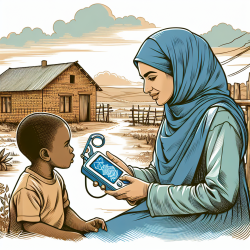Introduction
As practitioners in the field of speech language pathology and allied disciplines, our mission extends beyond the confines of traditional therapy. We are called to understand the broader societal issues that impact the children and families we serve. One such pressing issue is intimate partner violence (IPV), a pervasive problem intricately linked to patriarchal norms. The research article "Patriarchy's Link to Intimate Partner Violence: Applications to Survivors’ Asylum Claims" offers a wealth of data-driven insights that can inform and transform our practice.
Understanding the Research
The study by Saunders et al. (2022) delves into the relationship between patriarchal structures and IPV, particularly in the context of asylum claims. It highlights how patriarchal norms contribute to both the perpetration of IPV and the systemic failures to protect survivors. This research is crucial for practitioners who work with children and families affected by IPV, as it provides a framework for understanding the socio-cultural underpinnings of violence.
Key Findings and Applications
The study identifies several key findings:
- Patriarchal norms are a significant factor in IPV, influencing both individual behavior and systemic responses.
- Survivors of IPV often face barriers in seeking asylum due to these entrenched norms.
- Legal recognition of women as a particular social group can enhance asylum protections.
For practitioners, these findings underscore the importance of advocating for systemic change while providing support to individuals. By understanding the socio-cultural dynamics at play, we can better support survivors in their journey towards safety and healing.
Actionable Steps for Practitioners
To effectively implement the insights from this research, practitioners can consider the following actions:
- Advocacy: Engage in advocacy efforts to promote legal and policy changes that recognize IPV as a basis for asylum.
- Education: Educate clients and communities about the impact of patriarchal norms on IPV and the importance of seeking help.
- Collaboration: Work with interdisciplinary teams to provide comprehensive support to IPV survivors, addressing both immediate needs and long-term goals.
Encouraging Further Research
While the study provides a robust foundation, further research is needed to explore the nuances of IPV and its impact on diverse populations. Practitioners are encouraged to contribute to this body of knowledge by conducting studies, sharing case experiences, and collaborating with researchers.
Conclusion
By integrating the findings from "Patriarchy's Link to Intimate Partner Violence: Applications to Survivors’ Asylum Claims" into our practice, we can enhance our support for IPV survivors and advocate for meaningful change. This research not only informs our understanding but also empowers us to take action towards a more equitable and just society.
To read the original research paper, please follow this link: Patriarchy's Link to Intimate Partner Violence: Applications to Survivors’ Asylum Claims.










